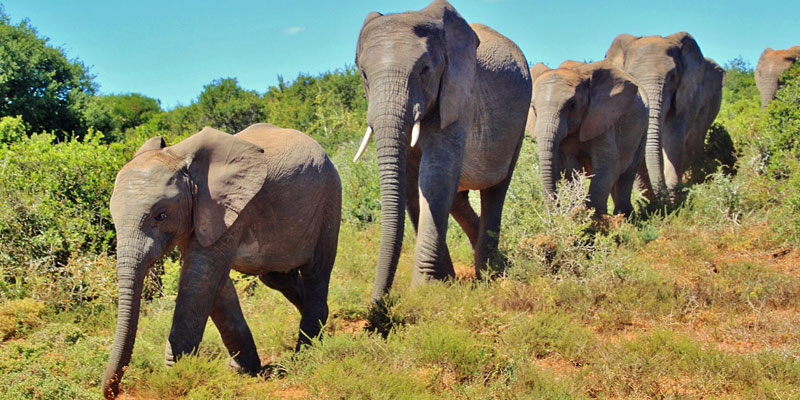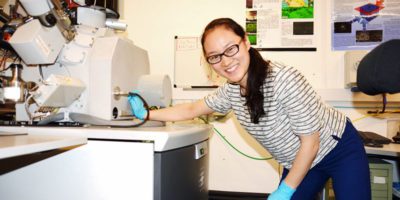Gillian Hill is a postgraduate researcher in psychology at the University of Buckingham researching the experience of insight beyond the cognitive domain. Gill’s studies have investigated insight experience in everyday life, identifying factors not addressed by the current experimental cognitive psychology approach, such as the existence of negative insights or ‘Uh-oh’ moments.
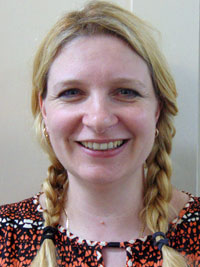
Gillian is speaking at the Milton Keynes Soapbox Science event taking place on Saturday 9th July 2016 from 2pm – 5pm at Centre:MK, Middleton Hall, centre:mk, 24 Silbury Arcade, Milton Keynes MK9 3ES. The title of her session is: “From elephants to Uh-ohs: The psychology of insight.”
It’s never too late to think about a career in science
I was working under a local authority contract that fell foul of the austerity cuts in 2011 and so took the opportunity of redundancy to make a change in career at the age of 37. I have always been interested in science, and spurred on by my frustration at lack of evidence-based decision-making in my previous role decided to study psychology at the University of Buckingham.
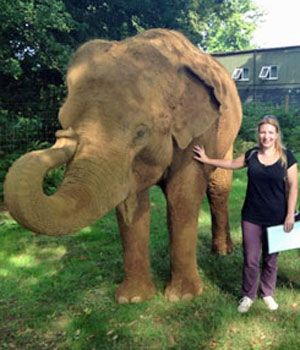
Psychology offered me an avenue to explore behaviour in a scientific way and in my undergraduate degree I particularly loved designing and conducting research to investigate such questions. It was my dissertation project exploring problem-solving behaviour in elephants that focused my interest towards insight.
When I decided that I wanted a career as an academic it was the natural progression to study human insight for my Ph.D. An added bonus is the teaching aspect of academic life. I am developing my skills as a lecturer and love seeing my undergraduate students having their own insight moments as they make connections.
Why do people do X or Y? It’s obvious isn’t it? Not always – run a series of psychology experiments to find out more. You might be surprised by what you discover…
Psychology is the scientific study of the mind and behaviour, and as such it incorporates lots of different job roles, many of which apply psychological knowledge – for example clinical psychologists focusing on aspects of mental health. The theories used by applied psychologists are developed through scientific research, and that is where I fit in.

Taking a scientific approach means that we identify questions, which we then test by running experiments. For me, this involves asking people about their insight experiences, often using online questionnaires. I then use what they tell me to design experiments. Among other things, my research has highlighted how insight plays a part in learning and counselling experiences; so a better understanding of it can be seen to be helpful in these contexts and beyond.
On a day to day basis I meet with participants who are taking part in my studies; analyse data using statistics; write up my results to produce articles that share my findings; I am also always thinking about new experiments that I want to do.
In addition I teach psychology undergraduate modules at my university. I currently spend about two days a week doing this. I deliver lectures and seminars, plus hold tutorials. In our university a tutorial means meeting weekly with the students in groups of up to seven and having in depth discussions about a topical piece of research. This is exciting as no two groups’ discussions are the same.
Finally, it is important to me that I reach as wider audience as possible to talk about my research. So, whenever possible I take part in events such as Soapbox Science to share ideas beyond the academic community.
Looking into the ‘A-ha’ and ‘Uh-oh’ moments in our daily lives
I hope that my time on the Soapbox will be less the case of just me talking and rather an opportunity for interaction. I plan to bring some props and hope that my audience will help me to explore ideas such as how an elephant might have insight. I will also be highlighting my more recent research.
For example, I am currently using the game ‘four in a row’ to measure factors relating to insight. As people play they have positive insights – ‘A-ha’ moments, and negative insights – ‘Uh-oh’ moments. I am hoping that we can get some of these happening on the day too.
More broadly, I believe that psychology is ideally placed to engage people with science at many levels. I will therefore be highlighting how everyone can get involved: not just by becoming scientists, but also by being participants in studies or thinking a little about the research they see highlighted in newspapers or social media.
The truth, the whole truth, and nothing but the truth
My long-suffering husband and children are obvious targets for me to practice on. There are no harsher critics than teenagers giving feedback to their own parent! They won’t hold back, which will mean I am as prepared as I can be to engage Milton Keynes shoppers on a busy Saturday afternoon. I do also need to work on my balance. I am very clumsy, so my main worry at the moment is that I might fall off the Soapbox!
There is no one ‘type’ of female scientist
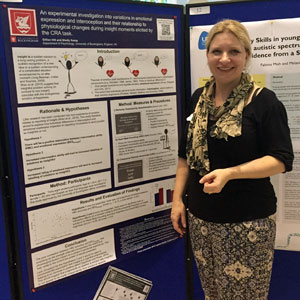
Outreach events like Soapbox Science are important for a number of reasons. Firstly, they provide a brilliant and unexpected opportunity for people to interact with scientists and hear about their research first hand. Secondly, they challenge the stereotype of scientists as eccentric old white men locked in a lab. The more diversity we can demonstrate the better.
While Soapbox Science has a focus on females in science, what is immediately apparent from the brilliant women I have met taking part in this year’s events is that there is no one ‘type’ of female scientist. My contribution to this is to hopefully show that women of any age can enjoy a second career in science.
Leaky pipe still present in psychology
Psychology is interesting as unlike some other sciences we see that the majority of students at A-level and university undergraduates are female. However, when you look at what happens over time, with seniority you see that the proportion of women in psychology declines. It has been likened to a leaky pipe, with a greater loss of female psychologists along their academic career compared to men.
This has implications for other sciences. It suggests that simply attracting more women to commence a career in science may not alone solve the problem of a general under representation of females, particularly in more senior roles in academic science.
All scientists have setbacks and make mistakes
I don’t recall any explicit advice as a woman in psychology. I think the best thing for me early on was realising that even the most brilliant psychologist, female or male, has setbacks and makes mistakes. I think this was due to my role models being authentic in their engagement with me as an undergraduate student.
In fact, I feel this is an essential part of science that is not acknowledged enough. We should celebrate our ‘Uh-oh’ moments as well as our successes, that way careers in science will seem more achievable to everyone.
It’s Happy 40th Birthday for the University of Buckingham this year
It’s exciting times ahead. For me, I hope to complete my Ph.D. within the next year and then hopefully continue my journey in academic psychology with a research and teaching post.
The University of Buckingham too has a big year ahead, as we are celebrating the University’s 40th Birthday, so we are pretty much the same age (I am 41 years old)! As a small, independent university we are distinctive in what we offer our students, both in terms of teaching and research opportunities. Our celebrations will be the perfect way to showcase why we consistently perform above our weight in league tables, plus a lovely excuse to eat lots of cake.
http://www.buckingham.ac.uk/psychology/researchstudents
https://twitter.com/uniofbuckingham

